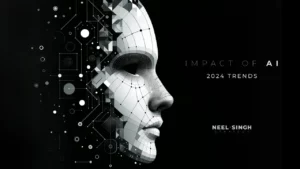(Opinion) The 2024 World Economic Forum in Davos is spotlighting the influence of Artificial Intelligence (AI) on the global stage.
AI is seen as a key driver for change, impacting 40% of jobs globally.
This presents a dual-edged scenario: AI can boost productivity and income but also risks job replacement and increased inequality.
Proponents, like the IMF Chief Kristalina Georgieva, believe AI could revolutionize productivity and global growth.
They argue that AI’s ability to process data quickly and efficiently can jumpstart sectors and economies.

For instance, AI in healthcare could mean faster diagnoses and personalized treatment, significantly improving patient outcomes.
In agriculture, AI can optimize production, reducing waste and enhancing food security.
However, critics express concerns about AI’s uneven impact across job sectors and regions.
High-skilled jobs in advanced economies, where up to 60% of jobs could be affected, are particularly at risk.
This could lead to significant job displacement and widen the gap between the rich and the needy.
There’s also the issue of AI’s ethical use and potential biases in its programming, which could further entrench existing societal inequalities.
The Davos meeting, amidst global challenges like geopolitical conflicts and the cost-of-living crisis, brings together over 2,800 leaders to rebuild trust and address societal divisions.
These discussions are critical in shaping how AI is integrated into our economies and societies.
The WEF survey underscores the mixed economic landscape, predicting varied impacts of AI across regions.
While AI could enhance productivity in wealthier nations, its benefits might be less tangible in low-income economies.
North-South divide
In conclusion, Davos 2024 highlights the need for nuanced, balanced policies to manage AI’s transformative effects.
There’s an urgent need to bridge the digital divide, ensure ethical AI development, and create policies that protect workers while harnessing AI’s potential for societal benefit.
The goal should be to use AI not just for economic growth but for inclusive, sustainable development that benefits all.

